Promet Split E-Tickets Finally Here: How to Get Yours
July 13, 2022 - The long-awaited Promet Split e-tickets are finally here and in practice on all 155 buses in the fleet.
The long wait in front of the ticket offices is finally over! Promet Split started creating contactless personalized tickets for specific categories of passengers in the new ticketing system, reports Slobodna Dalmacija.
The current passengers in the new ticketing system are: pupils and students who have a summer promotion, so their monthly ticket costs HRK 100, then people over 65 years old, voluntary blood donors, and family members of missing and fallen soldiers.
As reported by Promet, production takes place at the Sukoišan bus stop from Monday to Friday from 6:30 am to 8:00 pm and on Saturdays from 6:30 am to 12:30 pm.
The cost of creating a contactless personalized ticket is HRK 20 for all categories of passengers (the monthly/annual fee is not included), and it will not need to be changed as long as it is valid.
All users of previous annual contactless tickets exercise the right to drive with them until the ticket expires and are not obliged to exchange it immediately.
For example, pupils and students should bring a photo to be scanned and their identity card, i.e., birth certificate or residence card. Pensioners over 65 living in the city of Split can be issued an annual ticket, the price of which depends on the age. It is necessary to bring: a photograph (identity card size) that will only be scanned, an identity card, and a pension slip, i.e., a certificate from the Croatian Pension Insurance Institute that they have no income.
Members of DDK Split from the area of Split (men aged 40 and over, women aged 20 and over) should bring a photo (identity card size) that will be scanned and an ID card. In addition, existing users should bring the personalized contactless card they are currently using, and new users should bring a certificate of the number of donations issued by the Red Cross.
Families of missing and fallen soldiers residing in the city of Split need a photo, the personal contactless personalized card they are currently using, or a certificate from the Department for Croatian Veterans of the Homeland War SDŽ for a new identity card.
You can find the necessary documents for each passenger category here: https://promet-split.hr/obavijesti/izrada-beskontaktnih-personaliziranih-kartica-za-odre%c4%91ene-kategorije-putnika-u-novom-ticketing-sistemu
The e-ticketing system has started on all 155 buses. The system has already been installed in part of the bus. By the autumn, efforts will be made to replace most tickets. Promet expects the biggest impact on pupils and students, who must change their identification cards.
Ticket machines will be available 24 hours a day, tickets can be paid by card on the bus, and tickets can also be purchased via the mobile app, where other important information will be available.
"The display map will only have to be created the first time. After that, you don't even have to see the ticket anymore," said Miroslav Delić, Director of Promet, at the recent presentation of the new system.
For more, check out our lifestyle section.
New Split Public Buses Now Most Modern in Croatia's Entire Region
July the 2nd, 2022 - Part of the new set of Split public buses are now out on the roads of Croatia's second largest city, and they're the most modern not only in this country, but in Croatia's entire immediate region.
As Morski writes, 24 out of a total of 47 new Split public buses procured for the Split-based company Promet d.o.o. were recently presented, all of which were co-financed by the European Union (EU) from the Cohesion Fund.
This first set is the delivery of the first of three groups of new Split public buses for the aforementioned Promet transport company, while the rest will arrive during the height of the summer, meaning in the months of July and August, and their total value stands at around 100 million kuna.
''We're going to get the most modern fleet of buses not only here in the Republic of Croatia but also beyond the country's borders. During the month of July, we will implement the new e-ticketing system, the elements of which are starting to be installed in Split public buses. As such, we can say that our passengers really are going to receive the most modern service in terms of technicality and technology,'' said the director of Split Transport, Miroslav Delic.
The initial presentation of the new Split public buses took place at the Poljud statium on Thursday the 30th of June. As of yesterday (Friday the 1st of July) eight brand new solo city low-floor buses (MAN Lions City), eight solo city semi-low-floor buses (IVECO Crossway LE) and eight suburban buses (MERCEDES Intouro) began transporting passengers along the roads of the City of Split.
A contingent of articulated buses and minibuses is also expected during the months of July and August, which will add to Split's new and ultra-modern public transport offer which will be appreciated by both locals and visitors alike.
For more, make sure to check out our dedicated lifestyle section.
Split Destinations You Can Visit Using Public Transport
May 24, 2022 - You can spend a large part of your itinerary in the city centre, but did you know that you can get to know many interesting Split destinations by bus? We're going to show you how.
Whether it is a short visit or for a week, the City of Split can fill your itinerary with activities of all kinds, sights, gastronomic spots, and much more. But what if you feel the need to explore your surroundings? Surely from the window of your plane, shortly before landing, you noticed that Split is much more than just its centre. In the high season, you may want a little respite from the crowds, so why not explore some of the nearby Split destinations? By using public transport, you can save yourself the fees of renting a car to visit these relatively local destinations, as well as the tedious search for parking in the city.
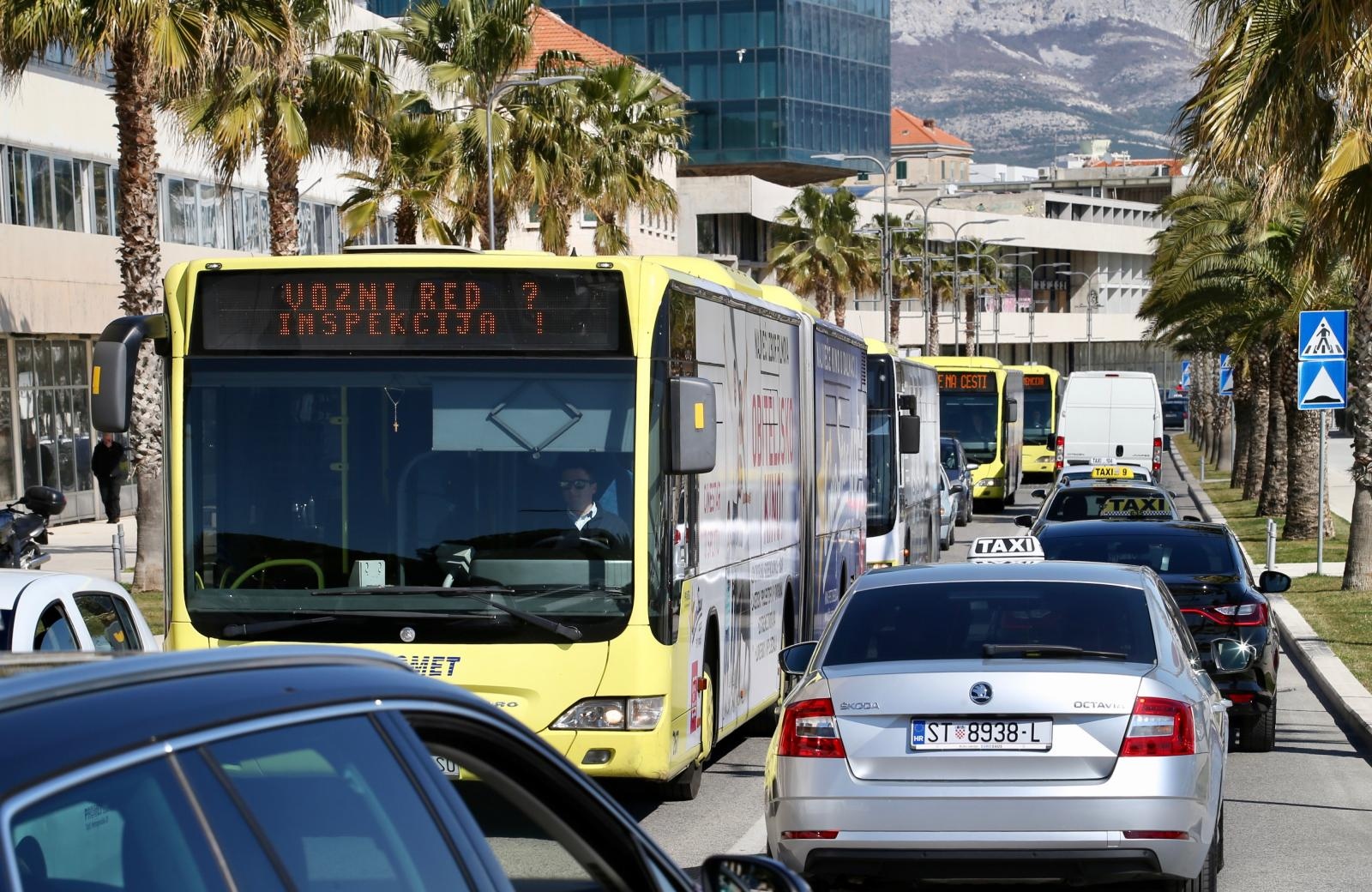
Photo: Ivo Cagalj/PIXSELL
The public transport system in the City of Split is called Promet (Traffic) and its buses can take you beyond the centre. The bus network is divided into four zones, and that is how ticket prices are determined (based on proximity to the very centre). If you're very clear about where you're going, you can buy your tickets at the Tisak stands indicating the area you are going to, or you can also pay the bus driver himself, indicating the exact destination you are going to.
The prices of bus tickets by zone are as follows:
Zone 1: 9 kuna
Zone 2: 13 kuna
Zone 3: 17 kuna
Zone 4: 21 kuna
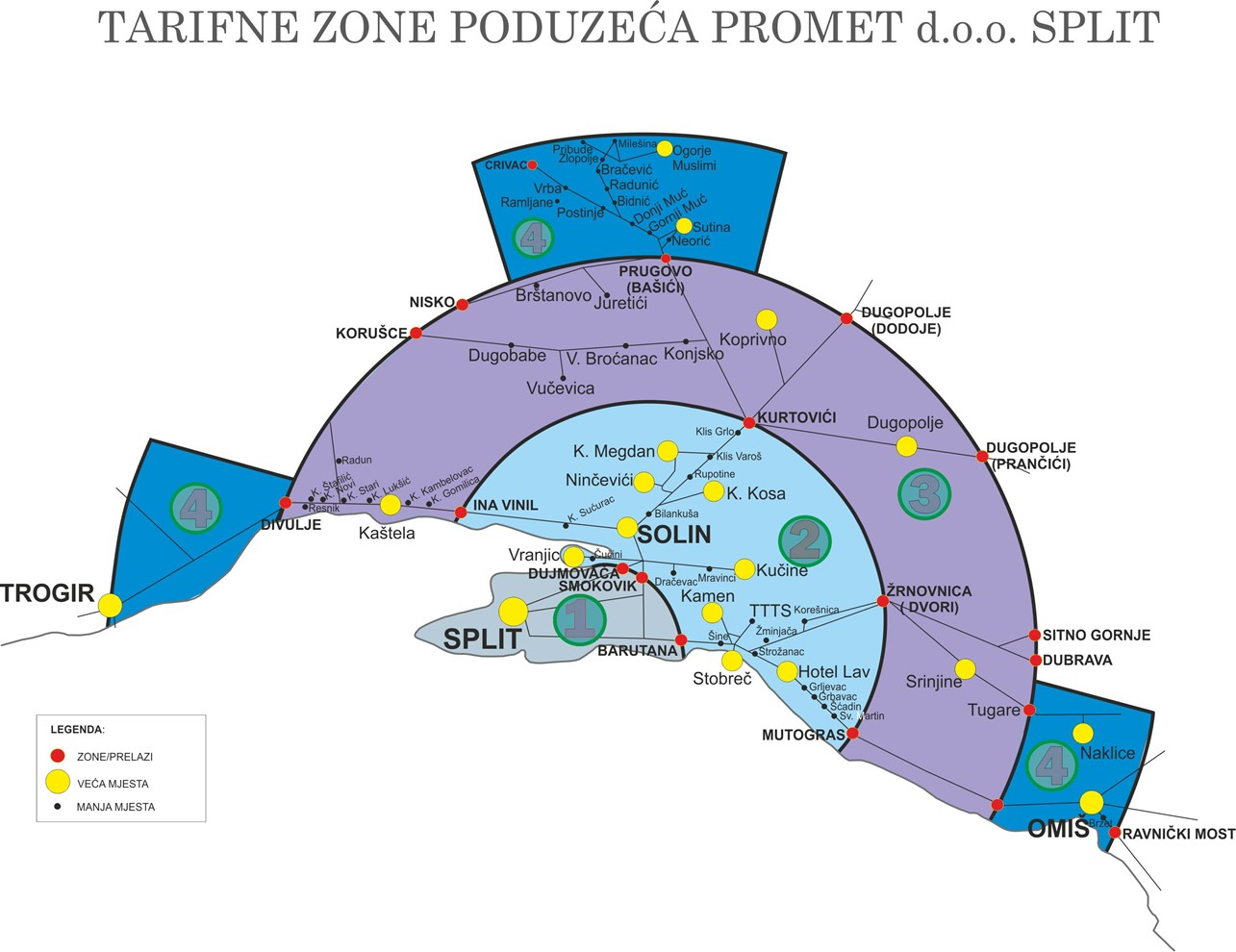
Image: Promet Split
Now, the question is, where do you want to go? Generally, everything in the centre of Split is part of Zone 1. You can choose between beautiful and less crowded beaches, small and picturesque old settlements, or even historical places beyond that zone. The choice is yours. Here are some ideas for Split destinations you can visit in zones 2, 3 and 4 with the city's public transport system.
ZONE 2
Solin
Solin is located very close to the centre, just northeast of Split. Originally called Solana, it was a Greek colony founded in the 3rd century BC, and later a Roman colony. At that time, it ended up becoming the fourth largest city in the entire Roman Empire. For a zone 2 ticket to Solin, you can go ahead and visit its impressive ruins. You'll need to get on bus number 2 (Split - Poljička - K. Sućuraj (Strinje) - Split Airport), or bus number 38 (Split - K. Stari - Resnik).
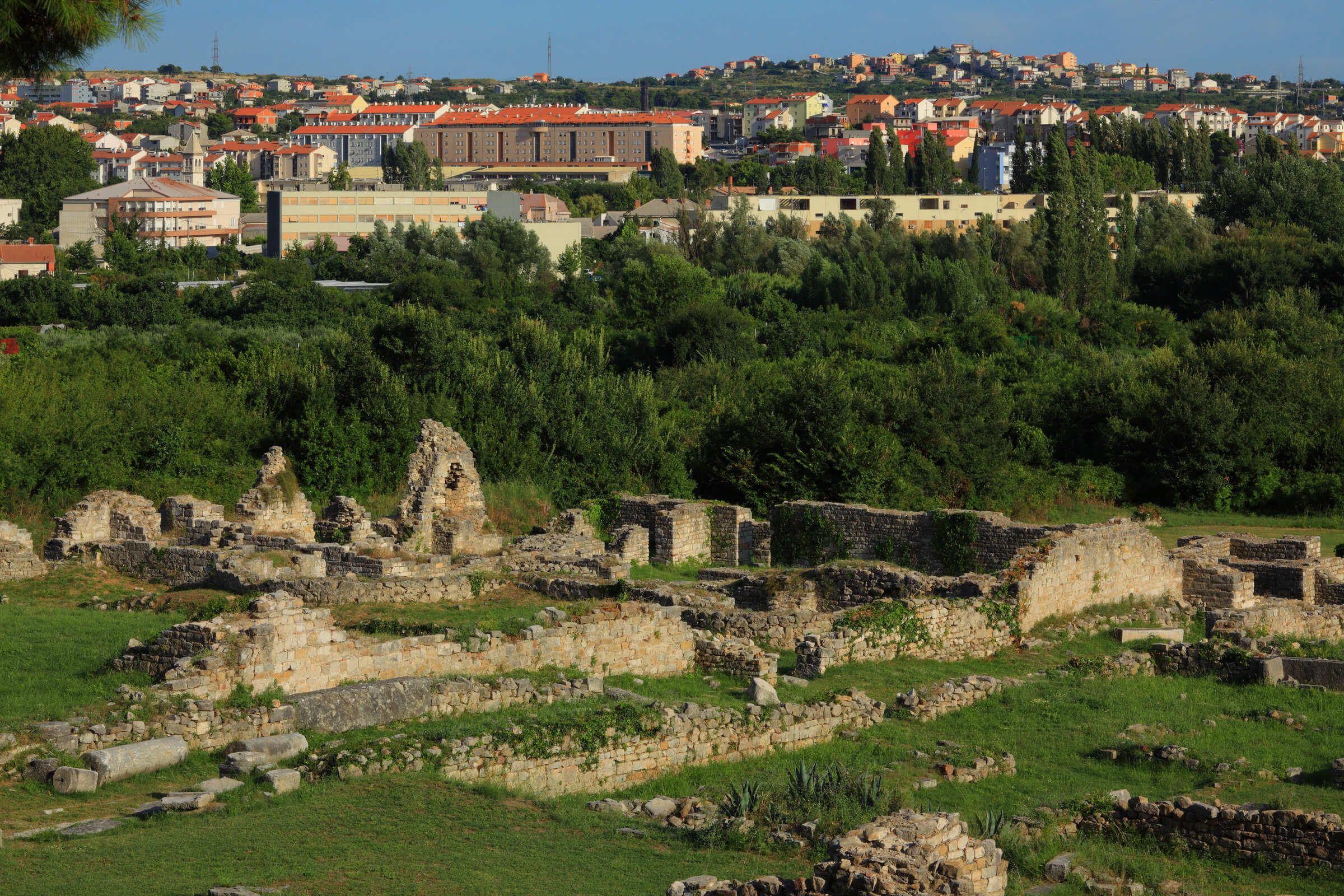
The ruins of Solin. (Photo: Mario Romulić)
Stobreč
On the southern loop of Split zone 2, Stobreč is the first destination you can get to. It's ideal if you are looking for somewhere nearby to relax and with a good number of bars and restaurants. Stobreč also has a golf course, if that's your thing. You'll need to get on bus number 60 (Split-Omiš) or number 25 (Split-Stobreč).
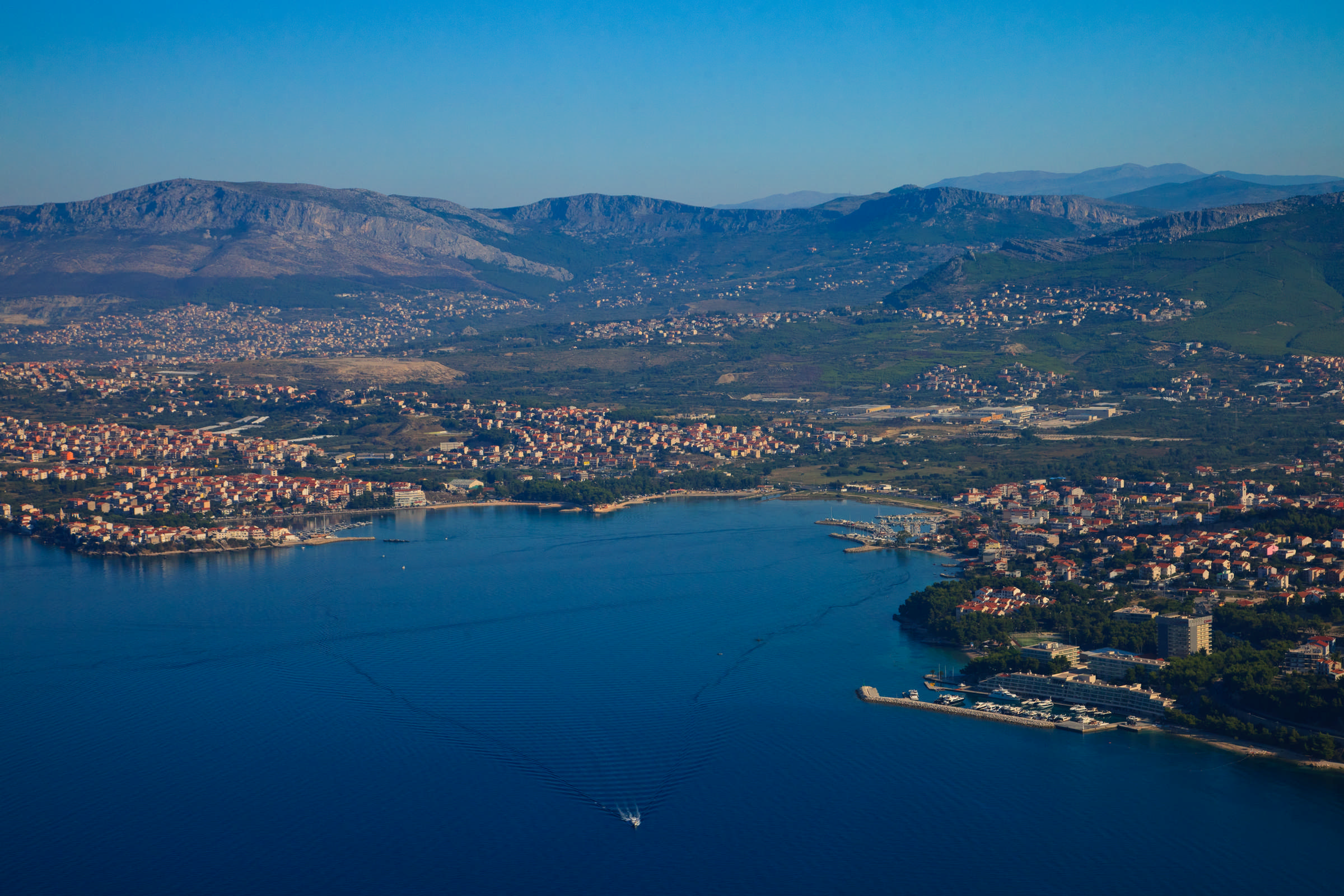
Overview of Stobreč. (Photo: Mario Romulić)
Podstrana
Passing Stobreč, you'll reach Podstrana. Podstrana has a large number of beautiful beaches, with bars and restaurants on them. I always say, if you are looking to enjoy the sea in Split and away from the crowds, go to Podstrana. If you're looking for something other than the beaches, you can also go hiking in the surrounding hills or kayaking on the Žrnovnica river. Did you also know that legends say that Podstrana is where the famous King Arthur could have been buried? You'll need to get on bus number 60 (Split-Omiš) to get here.
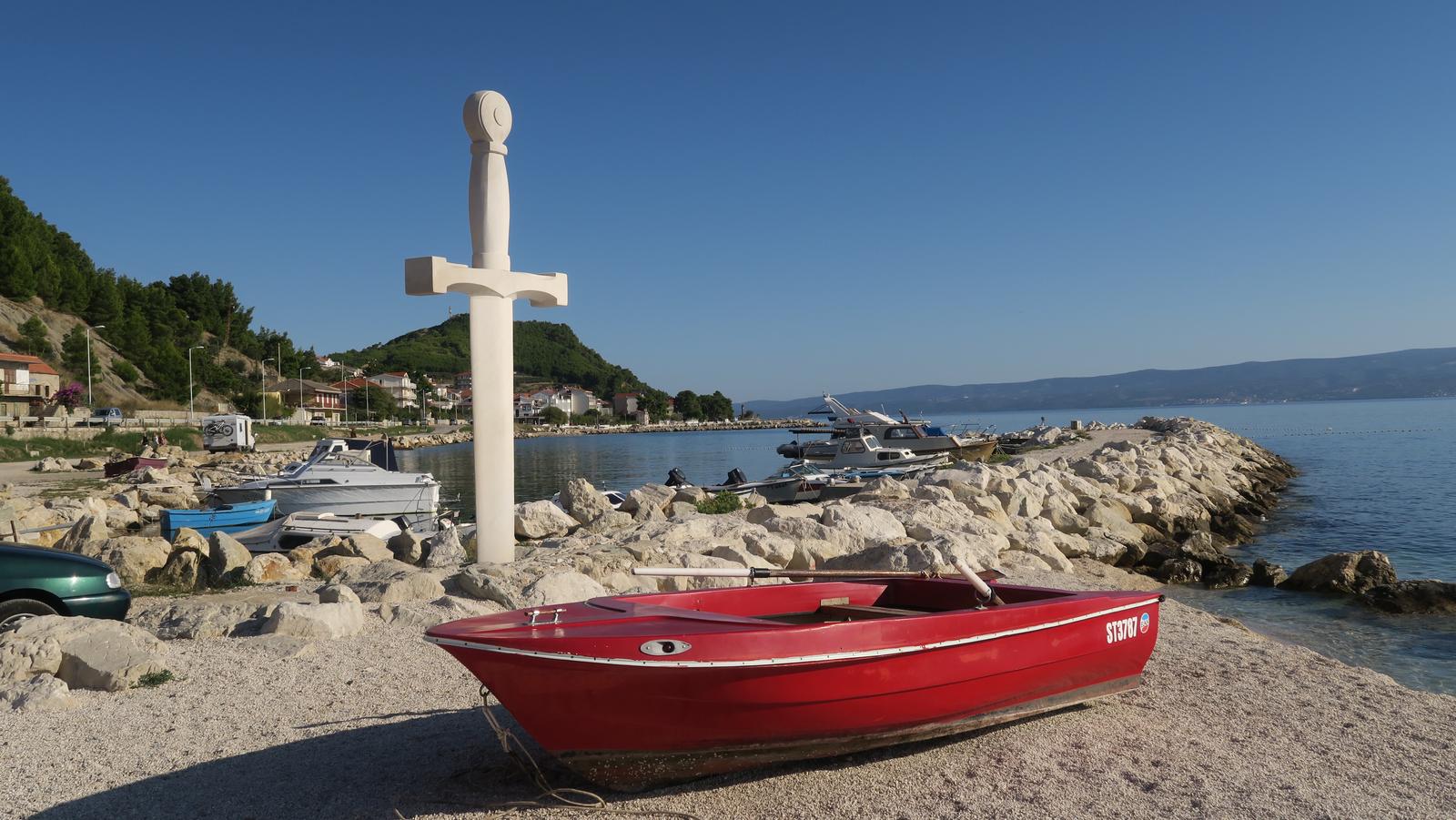
The sword of Artorus, in Podstrana. (Photo: Ivo Cagalj/PIXSELL)
ZONE 3
Kaštela
Please note that there is more than one Kaštela! It won't be something that will have much relevance when paying for your ticket, since they're all in the same area. Kaštela is located northwest of Split, on the way to the airport. No matter which Kaštela you decide to go to, be sure to enjoy its promenades, beaches, and marinas! You'll need to get on bus number 2 (Split - Poljička - K. Sućuraj (Strinje) - Split Airport), or bus number 38 (Split - K. Stari - Resnik).
Krilo
If you pass Podstrana, heading south, you will enter zone 3. There are many places that you can visit almost in succession: Mutogras, Jesenice, Sumpetar, Dugi Rat... Krilo has very nice beaches, as well. You'll need to get on bus number 60 (Split-Omiš).
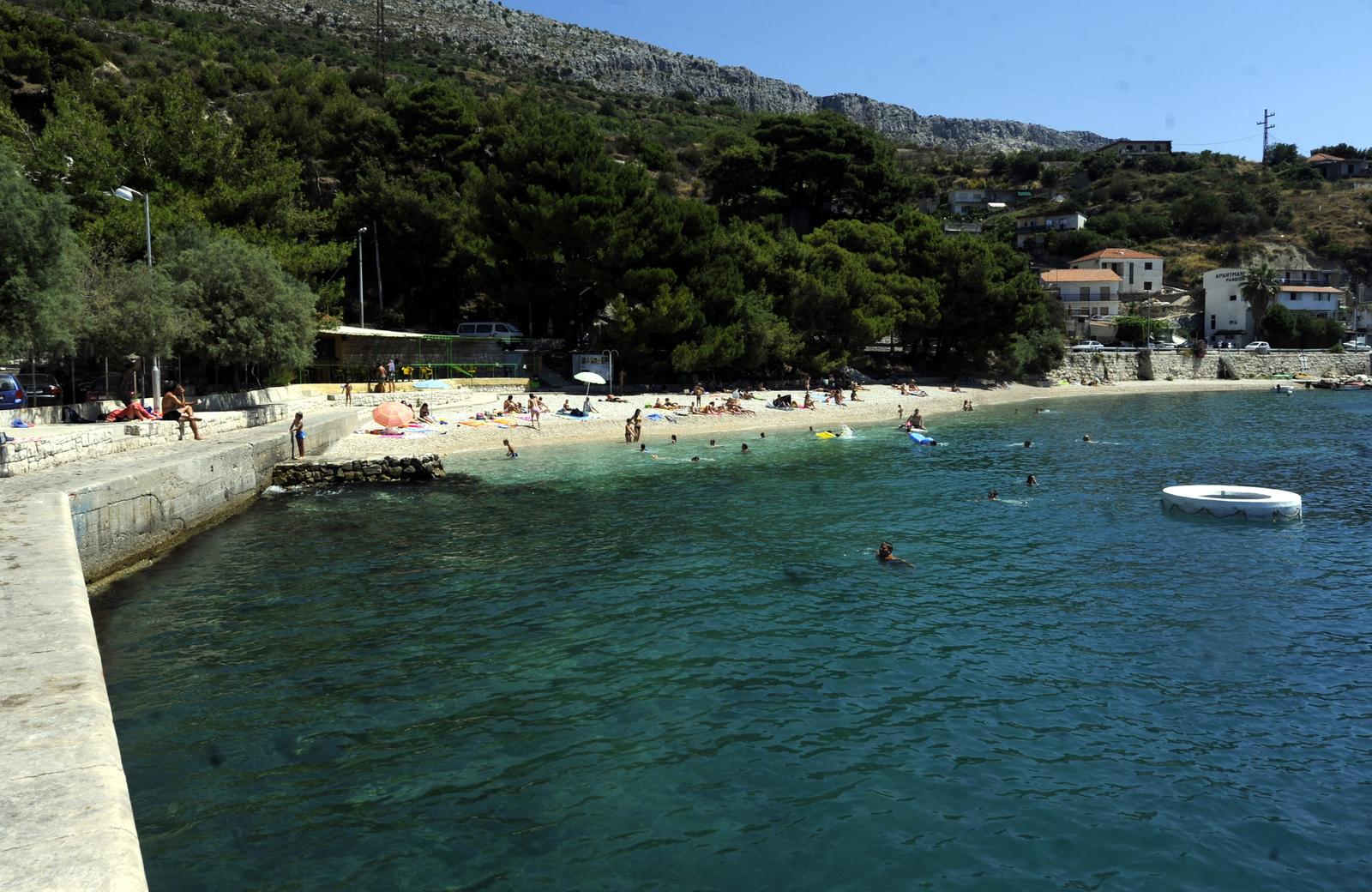
Krilo. (Photo: Tino Juric/PIXSELL)
ZONE 4
Duće
Duće is one of the last destinations in zone 3 to the south. Many continue on to Omiš, but Duće is a place that deserves all your attention for its beautiful beaches and camping sites. You'll need to get on bus number 60 (Split-Omiš).
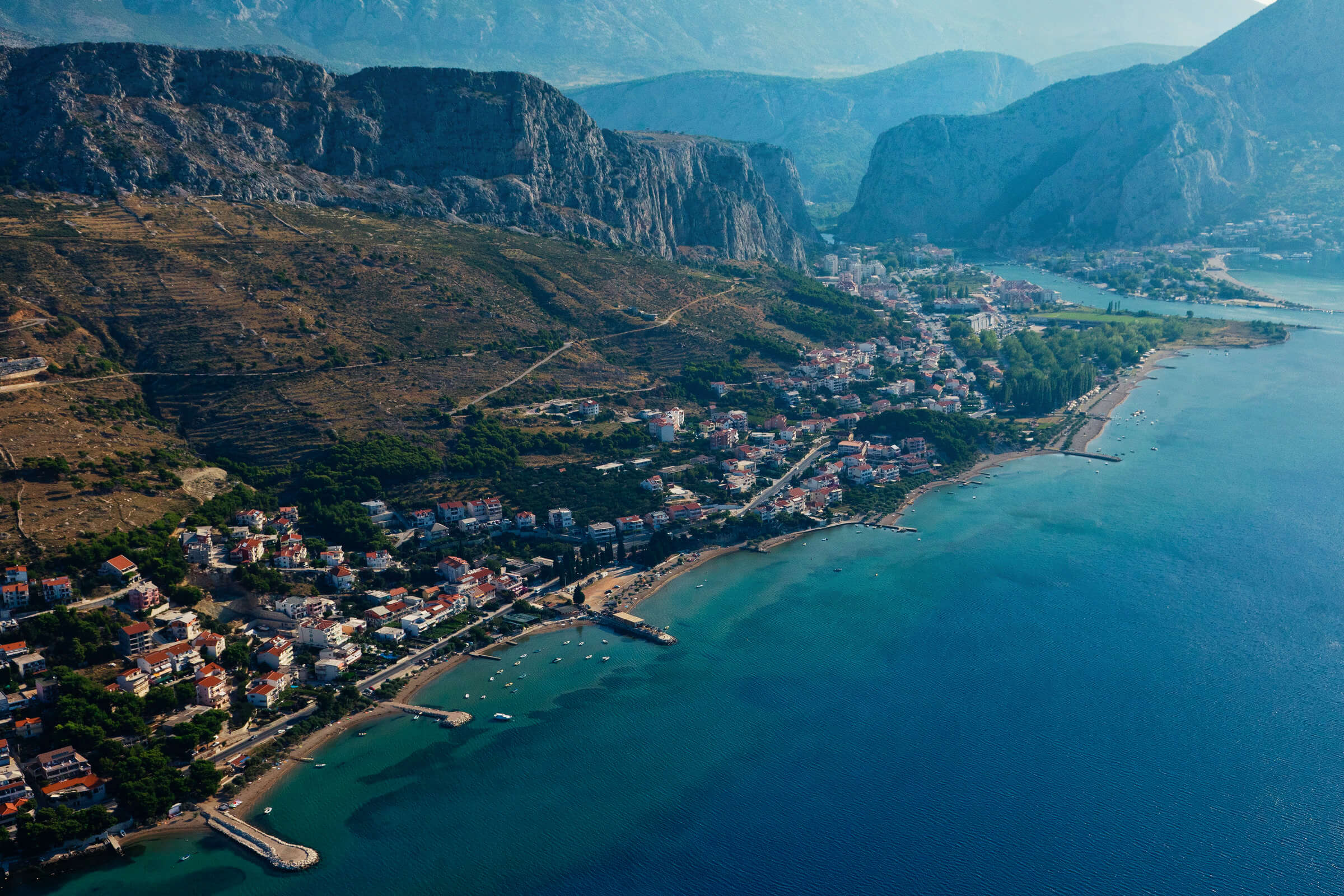
At the beginning of Zone 4, just before Omiš, you'll find Duće. (Photo: Mario Romulić)
Trogir
Passing the Split Airport, you'll find the very ancient and picturesque town of Trogir. Often regarded as the miniature version of Split, its beautiful promenade and narrow streets will stick in your mind for a long time. A good idea is to find pristine beaches in the bridge-connected island of Čiovo. You'll need to get on bus number 37 (Split - Split Airport - Trogir).
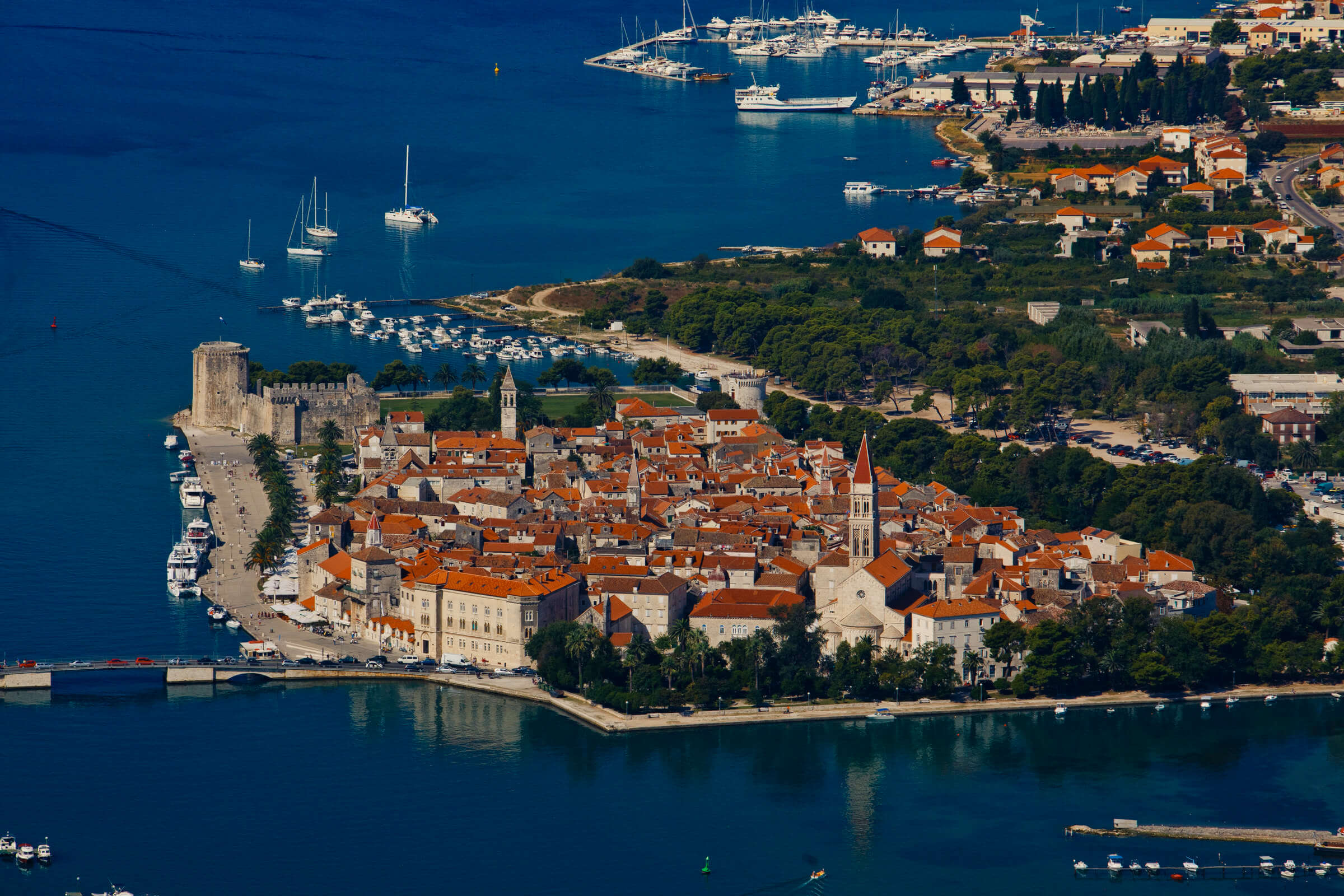
Trogir. (Photo: Mario Romulić)
Omiš
Omiš is one of the most popular and largest towns on the coastal road between Split and Dubrovnik. Just 40 minutes from the center, Omiš is a true jewel of the Dalmatian coast, with beautiful old streets, the Cetina canyon, and wonderful beaches. You'll need to get on bus number 60 (Split-Omiš).
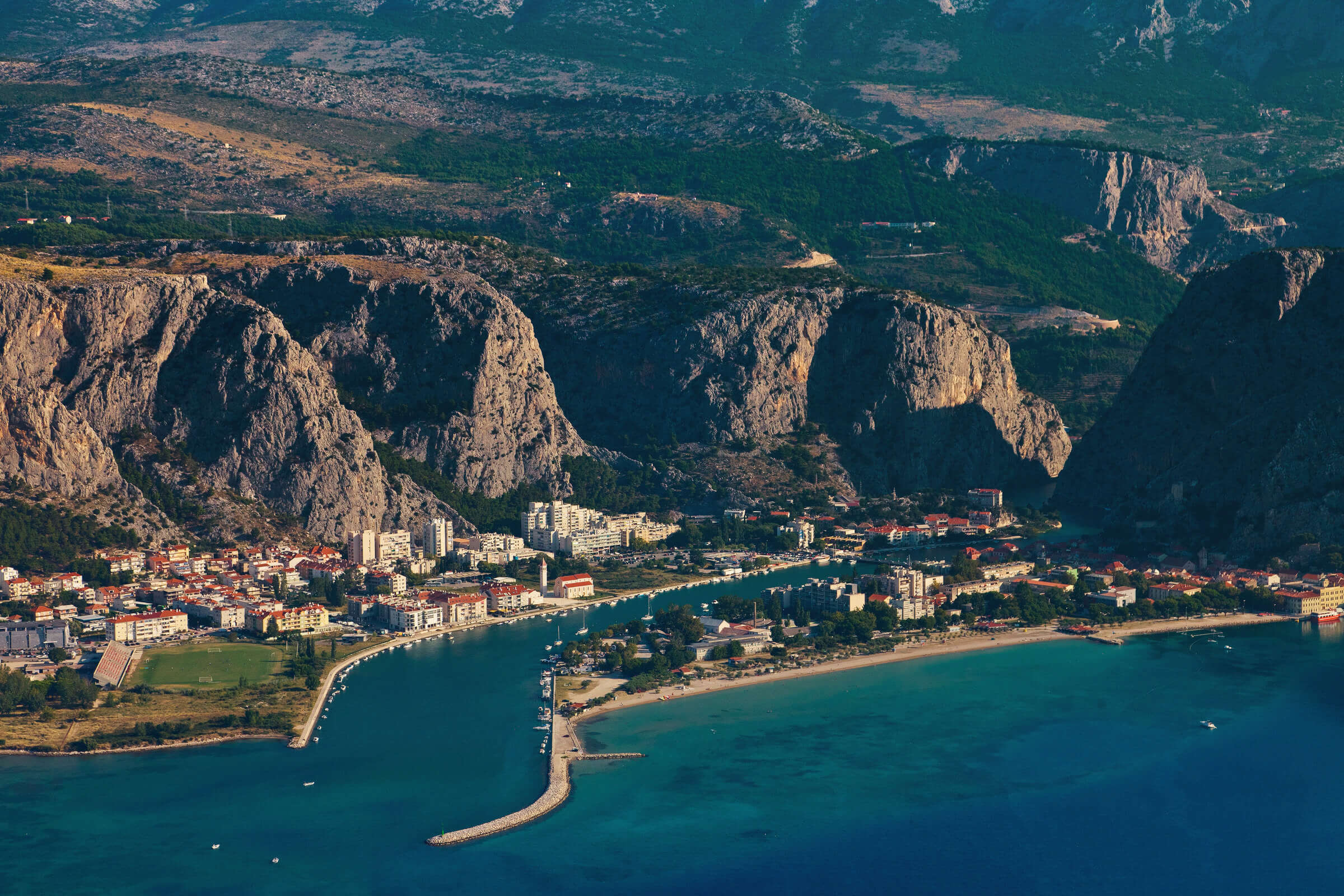
Omiš. (Photo: Mario Romulić)
For more information on Split's bus system, be sure to check the official website of Promet.
For more on travel in Croatia, follow TCN's dedicated page.
Promet Split Electric Buses Announced, E-ticketing from July 1, and Higher Ticket Prices?
May 18, 2022 - New Promet Split electric buses are in the plans, e-ticketing should finally kick off on July 1, but will bus transport become more expensive in Split?
As part of the European tour MAN #ElectrifyingEurope, the battery-electric city bus MAN Lion's City 12E arrived in Croatia, reports Dalmacija Danas.
A short presentation was held at the Amphora Hotel in Žnjan as this bus could soon transport the people of Split. Namely, Split-based Promet will apply for tenders for EU funds, and the studies have been conducted for more than a year. Negotiations are also underway with HEP so that there are no problems with charging.
"For the last year, we have been working on a study to be ready when opening public calls for buses. This is the latest technology, and of course, we will go in that direction. We have renewed part of the fleet with the latest generation diesel buses; we will have a presentation of the e-ticketing system in about 15 days," said Miroslav Delić, director of Promet Split.
This bus can travel 300 km on a single charge, and it takes 3 to 3 and a half hours to charge the batteries. It costs 550,000 euros. The capacity is 35 seats, while the total number of seats (sitting and standing) is slightly more than 80. Under each seat, there are USB sockets.
"Six months ago, we started negotiations with HEP to strengthen the substation within our complex and substations at locations in the city where we plan to introduce lines so that buses can be charged at these turning points," Delić said.
This is a low-floor city bus, 12 meters long, with a capacity of 88 passengers. Specifically, this bus is fully electric, powered by batteries located on the bus's roof and a central electric motor located on the rear axle of the bus. Battery capacity is 480-kilowatt hours, which means that it would have a range of 250 to 300 km in some actual driving conditions. Furthermore, it is fully equipped with all units as in the classic diesel bus, from heating, cooling, and air conditioning. In addition, most of the parts are from the diesel bus so that in the event of maintenance, these costs would be lower," explained Zvonko Gabud, sales director of Man Hrvatska.
Seven hundred of these buses have been sold across Europe, and they could soon be seen on Croatian roads. You can see more photos of them at Dalmacija Danas.
E-ticketing will be used from July 1, too, and with the rising fuel prices, Promet Split ticket prices could also change, adds Dalmacija Danas.
Namely, the fuel cost for Promet Split jumped by 15 million kuna annually.
"The question is whether we can change the prices because we do not have a representative of the majority owner, so now the question we ask the commissioners - is it possible for the Assembly to make that decision?," said Delić.
It is possible that there will be no price increase but under one condition.
"At the annual level, the cost of fuel is higher by 15 million kuna, so the cost of fuel is no more than 30 million kuna, but 45 million kuna at the annual level.
The price could rise by 20 percent, but the question is how much cities and municipalities are willing to co-finance with their budget funds. The price of the ticket depends on it. The ticket does not have to become more expensive if cities and municipalities co-finance public transport," Delić concluded.
For more, check out our business section.
Green Mobility: Promet Split Plans on Going Electric
February 15, 2021 - Promet Split could be the first company in Croatia whose fleet will include electric buses thanks to European funding. The Split city carrier also strives to have one of the youngest fleets in the region.
Dalmatinski Portal reports that at the end of July 2020, Promet purchased 18 new buses for HRK 44 million, of which 85 percent came from the European ITU mechanism (Integrated Territorial Investments).
The year before, 34 new buses were purchased for HRK 93 million, which the EU entirely financed through the Cohesion Fund.
On the other hand, this year, the beginning of the procurement procedure for about fifty more diesel buses and several electric ones is expected. Studies for applying for EU funds are ready, said Promet.
Mayor Andro Krstulović Opara proudly emphasizes that after that, the average age of Promet's buses will be between three and four years.
In addition to the new buses, the long-awaited e-ticketing system, billing, and traffic monitoring system should be implemented by the end of the year.
Director Miroslav Delic confirms that Promet has taken the issue of purchasing electric buses seriously. Hina said they have already done a great job preparing the documentation and studies they intend to run for European money.
The studies are based on several acceptable electric bus traffic areas, or eco-zones, areas along the strict city center and by the sea.
"We plan to procure more electric buses and the necessary infrastructure related to charging and maintaining buses," he said.
"The prices of electric buses will depend on the offers of the manufacturers, but we can say that the price of such a bus is expressed in hundreds of thousands of euros, without the necessary infrastructure, which means that they are twice or three times more expensive than diesel," Delic said.
Promet almost finished the study according to which electric buses would run through Marjan, the city center from the West Coast through the Marjan tunnel, Gundulićeva Street and Domovinskog rata Street, all the way to the city market, as well as by the sea in Duilovo, Trstenik, and Žnjan.
"We think it should be something that will allow us to get funding. But until the invitation is published, all this is informal," says Delic.
The call will show which study conditions must be met to be eligible. "This is how it works in any procedure for obtaining EU funds, regardless of whether it is electric or diesel buses of the latest generation or gas buses," Delic points out.
The Croatian ministries of economy and transport plan to publish a public call this year.
He finally adds that Promet's plans include preparing documentation for the construction of a new garage, taking into account that all possible types of diesel fuel are represented - hydrogen, gas, electricity, and hybrid combinations.
With its European Climate Pact, the European Commission promotes effective movement opportunities in a healthier and cleaner way. It encourages local and regional authorities to use cohesion funds to move towards green mobility. This, of course, includes the purchase of environmentally friendly buses, primarily electric or hydrogen-powered buses, because they have zero emissions.
To read more about lifestyle in Croatia, follow TCN's dedicated page.
After Smart Parking, Split Welcomes E-ticketing for Public Transport
November 13, 2020 - After receiving smart parking, Split welcomes e-ticketing for public transport and thus continues their smart city journey.
Gradonačelnik.hr writes that in accordance with world trends, in recent years, Croatia has been investing more and more in the development of smart city concepts and smart solutions that use modern technologies and digital solutions to raise the quality of life in cities. Given the increasing traffic congestion that has become a primary problem in the daily life of large cities, one of the key aspects of smart city development is certainly ‘Smart Mobility’ which is becoming a decisive factor in the quality and competitiveness of cities. The key goal is to increase the quality - reduce congestion, provide precise and accurate timetables, introduce a simple and efficient toll system, increase the number of public transport users to relieve city roads, and, ultimately, reduce environmental pollution.
After the transformation of public transport in many European cities, such as Prague, Belgrade and Brno, where contactless payment solutions for public transport have already been implemented, using the passenger's bank or credit card, smartphone or watch as a means of payment, Mastercard wants to be a partner to both Croatian cities and public carriers.
Therefore, they conducted a study on public transport in Croatia, which showed that in Croatian society there is a great demand for public transport services and a widespread culture of card payments, which are key prerequisites for further digital improvement of public transport services. The survey conducted as part of the study showed that citizens are generally satisfied with public transport in large Croatian cities, but see opportunities for improvement, such as reducing traffic jams, more reliable timetables, ease of use of services, and ticket purchase models.
By implementing contactless payment solutions in public transport, Mastercard can help key stakeholders develop a new generation of public transport, aimed at more satisfied end-users, more efficient operation of public transport companies, and environmental protection.
After being the first in Croatia to launch a smart parking project that covered over 1,300 parking spaces in the city with sensors and introduced an application that makes it easier for drivers to find free parking spaces, and then introduced a special smart parking system for people with disabilities in the city, Split is moving forward with the development of smart solutions that raise the quality of city traffic.
The city has provided over 12 million non-refundable EU kuna for the strategic project "Implementation of the e-ticketing system in Promet d.o.o. through the ITU mechanism" worth over 25.4 million kuna. The key goal of the project is to improve the quality of public transport by automating the process of charging for tickets and informing passengers to, ultimately, increase the number of passengers in public transport.
The process of selecting the most economically advantageous bidder within the public procurement procedure of the e-ticketing system by Promet d.o.o. is currently underway, and the system should come to life in the middle of next year, if everything goes according to plan.
"In addition to the support for the existing standard technologies of the paper card system, contactless cards, the system will also provide the possibility of using modern ticket technologies, via mobile phones, as well as the possibility of paying for the ride with bank cards on the vehicle. This will simplify and make it easier for passengers to buy tickets, and at the same time speed up the change of passengers at bus stops," says Ante Ivandić, head of the service for development projects and informatics at Promet.
At major bus stops, there are plans to install five machines to purchase paper tickets and contactless value cards, top-up, and extend the validity of tickets. In this way, passengers will be able to purchase and renew travel tickets while waiting for the bus, so that when entering the bus, they independently validate travel tickets, without the participation of the driver.
Introducing e-ticketing will provide additional opportunities for buying tickets, thanks to a mobile application to purchase tickets online, and a webshop platform for buying tickets online. In this way, all users, such as pupils, students, pensioners and citizens, would have the opportunity to extend the value of their tickets without physically coming to Promet's locations and wasting time unnecessarily.
"Also, to efficiently monitor the performance of individual lines, and to optimize the traffic offer, through the system we will get information about the actual number of passengers who entered or exited at each station, i.e., we will have data on the load of the vehicle per line, and accordingly make corrections and optimizations in the timetable. On the other hand, passengers and users will be provided with much more information through this system compared to the situation so far. It will be possible to better monitor the personal costs of transportation, passengers will have accurate information about bus arrivals, as well as assistance in selecting lines for a particular route, for the purposes of travel planning. The system will also make it easier for people with disabilities to find their way around, because on buses, an announcement (voice and visual) of the arrival at a particular bus stop will be introduced, and at important bus stops a voice announcement of the arrival will be established through information displays.
By introducing this system, we will modernize and improve the quality of the public passenger transport service in the area where we provide the transport service," Ivandić points out.
E-ticketing is designed as an integral part of the future joint system with other utility systems in the City of Split such as parking fees, city services, defined interfaces to other services, and will be integrated with SmartCity Split platform.
The introduction of this system should solve a number of problems in Split's public transport that negatively affect the quality of service and thus the satisfaction of citizens, from the inability to implement precise timetables, inability to monitor vehicles in real-time, congestion at certain stops, poor ticket collection, to the non-transparent distribution of costs and revenues among stakeholders. All this causes dissatisfaction with public transport users due to constant waiting, crowds, problems with buying tickets, but also unavailable information.
Thus, the City of Split, as the host city of the Urban Agglomeration of Split and other 12 cities and municipalities that are part of the Urban Agglomeration of Split, unanimously decided to direct part of the ITU mechanism funds intended for the Urban Agglomeration of Split to Promet d.o.o. Therefore, 42 million kuna of ITU grants were provided, namely 30 million kuna for the purchase of 18 new buses that were delivered in July this year, as well as 12 million kuna for the implementation of the e-ticketing system.
To read more about lifestyle in Croatia, follow TCN's dedicated page.
Promet Split Revamped with 18 New Buses, Director Announces New Projects
July 5, 2020 - Another shipment of new Promet Split buses, a total of 10 articulated Mercedes Citaro, is on its way from Germany, through Dugopolje, to the public transport garage in Kopilica. Their arrival is expected this weekend.
"In addition to these ten vehicles, eight new "solo" buses will arrive next week from the Czech factory that operates within the company "Iveco". The purchase of these 18 buses was realized through the European ITU mechanism, and it is worth around HRK 45 million, of which the non-refundable funds make up two-thirds of the investment, i.e., HRK 30 million. In the second part of July, all these vehicles will be put into service," Miroslav Delic, director of Promet, said for Slobodna Dalmacija.
In September last year, for the first time in the last ten years, Promet's fleet was significantly rejuvenated with 34 buses worth around HRK 93 million, of which part of the investment of around HRK 64 million was co-financed from European funds.
"With last year's new buses and these 18 that are coming to us, we come to the number of 52 vehicles that we will rotate on all our city and suburban lines.
Once all the buses are put into service, we will take out the same number of old vehicles that we have scrapped and are in our garage. This is another indicator of how we are working on rejuvenating the fleet. When these buses are delivered, the average age of our company's fleet will be seven years, and for comparison, last year it was 14 years," said director Delic.
But by all accounts, Promet won’t stop at this. According to the head of the public transport company, they have been working on studies for several dozen buses for months.
"There are four types of buses. We are working on it and we hope that funds will be opened at the end of July so that we can apply for a new procurement," Delic concluded.
The City of Split writes: "From Germany, a new contingent of Promet buses set off for Split - 10 articulated Citaro Mercedes. They should arrive in Split during Saturday evening or early Sunday morning, and after the procedure and registration, they will be available to the citizens of Split. Over the next few days, 8 new Iveco solo buses will arrive.
The purchase of these 18 buses was realized through the ITU mechanism, and it is worth around HRK 45 million, of which the grant is HRK 30 million.
It should be reminded that in September last year, for the first time, Promet's fleet was significantly rejuvenated with 34 buses worth around HRK 93 million, of which a part of around HRK 64 million was co-financed from EU funds.
A total of 52 new buses lowered the average age of Promet's vehicle fleet to only 4 years, and their purchase provided the citizens of Split with a more comfortable ride through the city streets.
Citizens, take care of the common property of all of us!"
The rejuvenation of the vehicle fleet should be only a part of improving the image of public transport in Split and in the vicinity of the city, because a number of other elements are missing in order for Split to reach the communal standard of Zagreb or Rijeka. More modern stations, timetables, online ticket purchases and a host of other facilities must be imperative for development and work in the sector.
To read more about lifestyle in Croatia, follow TCN's dedicated page.
Promet Split Back in Action Monday: Bus Timetables, Tickets, and Rules
April 26, 2020 - Promet Split is back in action on Monday. A look at the timetables, ticket prices, and rules.
According to the decision of the National Civil Protection Headquarters, public transport is back from Monday, and the same applies to Split, where only special lines have been valid until now, reports Slobodna Dalmacija.
As of Monday, Promet Split is almost back to its old ways. Bus tickets will be charged according to the usual price list, all Promet points of sale will operate at regular business hours, and tickets will also be available on buses at the driver's window.
Promet announced that regular public transport came to a halt on March 22, and all passengers who purchased March tickets have the right to ride with his ticket until Sunday, May 10, 2020. All passengers who purchase a May ticket will be stamped with the number four instead of the number five.
Specifically, to reduce operating costs, stamps that were printed for April will be used, but due to the interruption of bus operations, they have not been put on sale. Following the directions of the Headquarters, passengers are requested to use protective masks when using city buses.
Starting Monday, line #1 will run at 5, 6, 7, 8.30, 10, 11.30, 13, 14.30, 16, 17.30, 19, 20.30 and 22 hours. Line 2 from the Airport departs at 6.20, 8.55, 11.15, 13.30 and 16 hours, and from Split at 7.45, 10.05, 12.20 and 15 hours, while line 2A will not operate.
Line #3 from Lovrinac to Brda will operate at 5, 5.40, 6, 6.20, 6.40, 7, 7.20, 7.40, 8, 8.30, 9, 9.30, 10, 10.20, 10.40, 11, 11.20, 11.40, 12, 12.20. 12.40, 13, 13.20, 13.40, 14, 14.20, 14.40, 15, 15.20, 15.40, 16, 16.30, 17, 17.30, 18, 18.40, 19, 19.20, 20.00, 20.30, 21.30, 22 and 23. From Lovrinac, it will depart at 5, 5.20, 5.40, 6, 6.20, 6.40, 7, 7.20, 7.40, 8, 8.30, 9, 9.30, 10, 10.20, 10.40, 11, 11.20, 11.40, 12, 12.20. 12.40, 13, 13.20, 13.40, 14, 14.20, 14.40, 15, 15.20, 15.40, 16, 16.30, 17, 17.30, 18, 18.20, 18.40, 19.20, 19.40, 20, 20.45, 21.15, 22.15 and 22.45.
Line #3 will run at 5.20, 6.20, 7.20, 8.30, 9.40, 10.50, 11.55, 13.10, 14.20, 15.30, 16.40, 17.50, 19, 20, 21 and 22 hours, while line #6 will depart at 5.20, 5.50, 6.15 , 6.45, 7.15, 7.50, 8.15, 8.45, 9.20, 9.50, 10.15, 10.45, 11.15, 11.45, 12.15, 13.15, 13.45, 14.15, 14.45, 15.15, 15.45, 16.15, 16.45, 17.15, 18.15, 19.15, 20.15, 21.15 , 10.15 pm.
Line #7 from Žnjan to the West Coast starts at 5.30, 6.35, 7, 7.45, 8.30, 9.15, 10, 10.45, 11.30, 12.15, 13 and 14.30, and from the West Coast at 6.10, 7.05, 7.45, 8.30, 9.15. 10, 10.45, 11.30, 12.15, 13, 13.45 and 15.10.
Line #8 from Znjan departs at 6, 7.20, 7.50, 8.50, 9.20, 10.20, 10.15, 11.50, 12.20, 13.20, 13.50, 14.50, 15.20, 16.20, 16.50, 17.50, 19.20, 20.50 and 22.20, and from Zvončac at 5.25, 6.45, 8, 8.30, 9.30, 10, 11, 11.30, 12.30, 13, 14, 14.30, 15.30, 16, 17, 17.30, 18.30, 19, 20, 20.30, 21.30 and 22.00.
Line #9 runs at 5.30, 6, 6.20, 7, 7.20, 8, 8.20, 9.15, 9.40, 10.20, 10.40, 11.20, 11.40, 12.20, 12.40, 13.30, 14, 14.30, 15, 15.30, 16, 16.30, 17, 17.30 , 18, 18.30, 19, 19.30, 20, 20.30, 21, 21.30, 22 and 22.30. Line #10 (Japirko - HNK - Japirko) will depart at 5.10, 6.05, 7.10, 8.10, 8.50, 9.40, 10.5, 11.55, 13.25, 14.55, 16.25, 17.55, 19.25, 20.55 and 22.25.
Line #11 (Ravne njive - Pujanke - HNK - Ravne njive) runs at 5.55, 6.55, 9, 10.15, 11.30, 12.40, 13.50, 14.55 and at 15.55.
Line #12 (Sv. Frane - Bene - Sv. Frane): at 5.50, 6.30, 7.10, 7.45, 9, 10.15, 11.30, 12.45, 14, 15.15, 16.30, 17.45, 19, 20.15, 21.30 and 22.45, while line #14 (Brda - Kopilica - Žnjan - Duilovo - Brda) does not operate.
Line #15 (Duilovo - Žnjan - Ferry Port - Duilovo) operates at 5.05, 5.30, 6.05, 7.05, 8.05, 9.35, 10.35, 11.35, 13.05, 14.05, 15.05, 16.05, 17.05, 18.05, 19.05, 20.05, 21.05 and 22.05 and #16 departs at 5, 6, 7.10, 8.45, 10.15, 11.45, 13.15, 14.45, 16.15, 17.45, 19.15, 20.45 and 22.15.
Line #17 (Spinut - Lora - Trstenik - Lora - Spinut) departs at 5.30, 6.35, 7.45, 9.25, 10.40, 11.55, 12.45, 13.10, 14.40, 15.15, 17, 18.10, 19.20, 20.30 and 21.40. Line #18 (Brnik - HNK - Brnik) runs at 5.15, 6.20, 7, 7.20, 8, 8.20, 9, 9.30, 10.20, 10.40, 11.20, 11.40, 12.20, 12.40, 13.20, 13.40, 14.20, 14.40, 15.20, 15.40 , 16.20, 16.40, 17.30, 18, 18.40, 19, 19.40, 20, 20.40, 21.10 and 22.10. Line #20 (Ravne njive - Zvončac) does not operate.
Line #21 (Sv. Frane - Meje - Sv. Frane) departs at 9.45, 11, 12.15, 13.30, 14.45, 16, 17.15, 18.30, 19.45, 21 and 22.15.
The timetable of the other lines can be checked on the Promet website.
To read more about travel in Croatia, follow TCN's dedicated page.
COVID-19 in Croatia: Recommendations for Public Transportation Published
April 25, 2020 - The Croatian Institute of Public Health has issued recommendations for the transportation of passengers by trams and buses in Croatia during the coronavirus pandemic.
Index.hr reports that the recommendations are in place to protect drivers and passengers, including driver's hygiene, driving with masks, physical distance and passenger space.
The hygiene of the driver's area and his work environment is maintained by cleaning the surfaces daily with surface disinfectant. In particular, areas that are often touched by hands such as door handles, the steering wheel, worktop, and shelf for ticketing should be cleaned.
The driver is advised to wear a mask while driving if it does not interfere with safe driving. The protective mask should be changed regularly, and always when it becomes moist and wet. If possible, passengers should wear protective masks if it does not affect their breathing.
Before and after removing the mask, hands should be washed with warm water and soap or disinfected. Used disposable masks are disposed of in garbage bags that are placed in buckets with a lid.
Regular hand hygiene is required and, whenever possible, you are to wash your hands with soap and water for 20 seconds. If this is not possible, disinfectants containing 70 percent alcohol are used.
Hands should be washed before entering and after leaving the vehicle, after cleaning the vehicle or when the hands are visibly dirty and in other recommended situations (after using the toilet, before eating, after wiping the nose).
The disinfectant must be available at the entrance to the vehicle, and at the entrance to the bus and tram, hand sanitation is required for the vehicle staff and passengers.
Hands, eyes, mouth and nose should not be touched because the virus can enter the body in this way, close contact with passengers and their luggage should be avoided when communicating with them, and a distance of one to two meters in daily social contact with passengers and others should be maintained. If drivers place luggage in the luggage compartment, then the hands should be disinfected afterward.
Passengers should be informed of the importance of maintaining a distance of at least one meter from each other. Precautions should be observed, especially if passengers with respiratory symptoms are observed.
The number and arrangement of passengers on the tram should be such as to allow the prescribed distance between them. It is advisable to limit the number of passengers in the tram to the number of seats.
On buses, the number and arrangement of passengers in the seats are such that they allow a prescribed distance between them. One person should be seated in a row so that they sit alternately in the left and right seats.
The recommendations also highlight the importance of being aware of the way the coronavirus is transmitted - when an infected person speaks, coughs or sneezes near a healthy person or by touching objects and surfaces contaminated with the respiratory secretions of an infected person, and then by touching the eyes, nose or mouth.
Therefore, it is also necessary to maintain hygiene - cover your mouth with the inside of your elbow or paper handkerchief when coughing or sneezing and then throw the handkerchief in the waste bin and wash your hands.
Regular cleaning and ventilation of the interior of the vehicle before and after driving is required. When cleaning the inside of buses and trams, special attention should be paid to window glass and handrails.
When stopping at stops, it is necessary to ventilate the passenger compartment regularly. While driving, the inside of the bus can be ventilated, but in trams and buses, it is necessary to avoid the use of air conditioning and heating.
It is recommended that windows be opened while driving, weather and temperature permitting.
Payment for tickets should be encouraged with contactless cards or bought online, and if a classic card payment or cash is used, disinfect hands after payment.
Controllers must wear a mouth and nose mask when in contact with passengers, and use disposable gloves, which must be disinfected or changed after each tram is visited, and the mask must be changed regularly as recommended.
Also, it is recommended that buses set up a physical barrier between the driver's seat and the passenger (Plexiglas or similar), and if this is not possible, the front row of seats behind the driver will not be used to transport passengers.
If driving staff or their family members develop symptoms suggestive of COVID-19, such as fever, sore throat, coughing, difficulty breathing, they should not go to work and notify their employer immediately.
The HZJZ points out that most of the recommendations of hygiene measures can be applied to other forms of organized road transport.
The latest recommendations can be found on the HZJZ website, and recommendations for the transportation of passengers on buses and trams provide instructions for using hand sanitizer.
As of Monday, when public and suburban public transport is reintroduced, ZET in Zagreb will launch 111 bus routes according to a custom timetable.
Thus, instead of trams in traffic, there will still be bus lines operating the routes of night tram lines (31 Crnomerec - Savski most, 32 Prečko - Borongaj, 33 Gracansko Dolje - Savišće and 34 Ljubljanica - Dubec). Tramlines will be gradually established, depending on safety assessments and the condition of the lanes they cross, ZET reported on Friday.
In order to comply with epidemiological measures, it is recommended to wear protective masks, hand disinfection, and keeping a social distance.
As of Monday, April 27, public transport of passengers on scheduled routes with the payment of tickets is restored in Split, and accordingly, the transport on special lines ceases, which was free of charge with the presentation of passes or civil protection cards.
"As of Monday, all Promet d.o.o. from Split it will operate at normal business hours, and tickets will also be available on buses from the driver. As regular public transport was abolished on March 22, all passengers who purchased the March stamps have the right to travel with this ticket until Sunday, May 10. All passengers who buy a ticket for May may be stamped with number 4 instead of 5. Namely, in order to reduce operating costs, the stamp will be used which was printed for April, but due to the interruption of bus operations, they were not put on sale," said Promet Split.
To read more about travel in Croatia, follow TCN's dedicated page.
Promet Split Announces New Timetable with Reduced Lines
March 16, 2020 - Taking public transport in Split? New timetables have been released by Promet Split with reduced lines during the coronavirus crisis.
Due to the unique situation in Croatia caused by the coronavirus, and to act preventatively, from March 18, 2020 (Wednesday), the timetable for Promet Split bus lines has been altered so that on working days (Monday - Friday) the Saturday timetable will be applied for the following lines:
Lines number 1, 2, 3, 5, 6, 7, 8, 9,10,11,12,16,17,18, 22, 24, 25, 26, 27, 28, 29, 31, 32, 33, 34, 35, 36, 37 and 60; with the following additions:
- on line 7, an additional departure at 15:10 from the West Coast,
- on line 28, additional departures are introduced at 06:20 from Dubrava and at 16:00 from Split,
- on line 31, 32, 33 departures at 15:30 from Split,
- on line 35, departure starts at 16:15 from Split
Lines number 67, 68, 69, 71, 73, 76, 77, 80, 81, 86, 91, 93 operate according to the usual timetable, without changes, except departures on line 80 (no departures at 10:00 from Split and 10:00 from Drnis)
Night lines 23, 39 and 40 will not operate until further notice.
Trogir:
Promet lines operating in the wider area of Trogir on weekdays (Monday - Friday), will run on the Saturday timetable, with the following additional departures introduced:
- on line 49 Vinisce-Trogir 17:50
- on line 51 Trogir-Ljubitovica 15:30
- on line 52 Trogir-Vinovac 15:30
- on line 47 Trogir-Dograde 15:30
- on line 49 Trogir-Vinisce 15:30
- on line 52 Trogir-Vinovac 22:25
Direct lines departing at 07:00, 07:30 and 08:00 from Trogir to Split are also canceled.
This timetable will be in force until further notice, following the development of the situation. In coordination with the Civil Protection Staff of Split-Dalmatia County and the City of Split, additional changes to the timetable will be introduced, which will be announced promptly.
Recall, Promet disinfected the interiors of all 160 city buses in its fleet last week.
"In agreement with the City Civil Protection Headquarters, our goal is to increase safety for our passengers and drivers," said Transport Director Miroslav Delić, adding that in addition to disinfecting buses, disposable gloves for all drivers, hand disinfection gels and protective masks that drivers can use at their discretion are also available.
To read more about travel in Croatia, follow TCN’s dedicated page.


